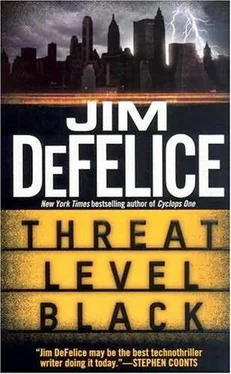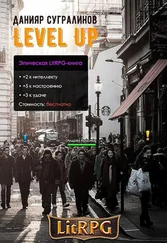“Why search again?” asked Macklin when he came back downstairs. By now Mrs. DeGarmo’s “stories” were on and she was in the front room, watching them.
“Best place to hide something now,” explained Fisher, helping himself to some coffee. “Come back after it’s been searched.”
“No way,” said Macklin.
Fisher sipped the coffee, which was ever more bitter than he remembered. He wondered if maybe he should go into the plumbing business so he’d have a legitimate excuse to visit Mrs. DeGarmo when the case ended.
“You’re grasping at straws, Andy,” added Macklin. “You know this case is closed.”
Fisher said nothing, examining the list of items seized during the earlier search. Faud’s computer had checked out clean; besides his schoolbooks, the only papers he had in his apartment had been junk mail. He had two pairs of “battered dress shoes,” three red button-down shirts, assorted T-shirts, one pair of polyester pants, two pairs of dress pants, and one pair of jeans.
No suitcase? No backpack?
No underwear or socks.
Fisher took a long sip of coffee. The grains from the bottom of the cup settled on his tongue.
Heaven. But he had no time to linger.
“All right,” he told Macklin. “Let’s get going.”
“Where?”
“Library.”

According to the want ads, there had been more than a dozen vacant apartments in the immediate area the week before. Ruling out ones still advertised this week, Fisher found eight possibilities. He also got a list of apartment brokers.
“You have your people go to each one with the description of Faud Daraghmeh,” Fisher told Macklin, giving him the list. “It’s probable that he’d take an apartment within ten or so blocks of the train, something easy to walk.”
“Why don’t you think they already had a place set up somewhere else?” said Macklin.
“I do. But we haven’t found it, and this is the grasping-at-straws phase of the case,” said Fisher. “So we have some serious grasping to do.”
“Andy, the case is closed,” said Macklin. “It’s done. Don’t you think?”
“No,” said Fisher. “And I’ll tell you something else: The fact that we can’t find this guy makes me worry. A lot.”
“You’re worrying? Really?”
“That’s my point,” said Fisher.
Fisher made his way into Manhattan and up to Washington Heights, where he went not to the apartment that had been raided but to the shoe repair shop across the street. The proprietor stood at his workbench behind the front counter, looking exactly as he had when Fisher had last been there. The only sign that he had moved in the interim was the fact that there were no cobwebs or dust on him.
“You’ve come for the other heel,” said the man when Fisher walked in.
“I’m always looking for other heels,” said Fisher. “You remember me?”
“I fixed your right heel the other day.” The man pointed to a book of tickets. “You’re number 657A92. You take a D width. Wide foot.”
“Wide foot, big brain,” said Fisher. He slipped off his left shoe. “How much?”
“Ehh. Ten dollars. Two minutes.”
Fisher reached for his wallet.
“No, you pay when it’s finished.” The cobbler reached over to the side of his bench and pulled over a thick book of customer tickets. “Here. Fill this out.”
“What? Another one?”
“Every job gets a new receipt,” said the man. “Everyone comes into the shop-new ticket.”
“Everyone?”
“Sí. I have this shop for fifty years. Every customer gets a receipt. You know how many shoes I lose? None. Because they have a receipt. That is the secret to a fine business. Receipts.”
“Even for ten minutes?”
“Every customer has to have a ticket,” the man assured Fisher. “Every one. Address and phone number. Those are the rules. You think I stay in business for fifty years without a system? You make one exception, you know what you get?”
“Tennis shoes,” said Fisher.
The proprietor nodded grimly.
“Your helpers do that too? Fill out receipts.”
“My helpers? Of course.” The cobbler frowned. “Someone comes in, they make out a ticket.”
“Just to talk?”
“No talking. Work only.” The man’s frown deepened. “Maybe that’s why they quit, eh? They don’t even have the respect to tell me to my face. I have to guess when I don’t see them. These people.”
“They spend a lot of time talking to people when they worked here? Friends or anything?”
“No talk. I pay good money to work. Work only. No friends. None.”
“No one?”
“Everyone who comes in: shoes and a ticket. You want to talk, you go to Joe’s down the street.” He gestured in the direction of a barber. “He talks. Aiyeee, he talks. Numbers too.”
“Did they know any customers?”
The cobbler rubbed his chin with his little tack hammer. “Well, customers. They bring a few. That’s good for business.”
“They filled out a ticket?”
“All the time. Those are the rules.”
The tickets were discarded once the book was filled, but by then the important customer information had been added to the owner’s permanent records. Each night after closing, the cobbler copied the day’s ticket stub information into a black-and-white marble notebook of the sort schoolchildren once used before the days of PDAs.
“See, is guaranteed,” explained the cobbler. “A sole, guaranteed for the life of the shoe. What if you come in next year, you say I have given you a sole, when all I did was the heel? Ehhh.” He waved his hand as if he were smacking an imaginary cheater.
“You don’t remember your work?” said Fisher.
“Oh, I remember, but this way, I put it on paper, the customer just nods. I learn in the early days. Believe me, people cheat you.”
“I’ll bet,” said Fisher.
After Fisher’s heel was fixed and paid for, they sat together going over the notebooks from the past six months. Fisher jotted down addresses of people the cobbler didn’t recognize as being longtime residents of the area.
It amounted to only three entries. Each name was Arabic, though that was hardly telling in New York.
Fisher found a cab that had somehow strayed uptown in error and went to check out the addresses. One was over on Amsterdam Avenue, a few blocks away in a large apartment complex; the second was up in Inwood, the very northern tip of the island. And the third one didn’t exist.
Which naturally made it the most interesting of all.
The bomb had already been made for him. All Faud had to do was put the wiring in and set it in the hallway. He had been warned to follow the directions very carefully or face catastrophe. He worried now as he stood with the wire over the connector: Had he followed the steps precisely right?
Surely he had, he told himself. It was a devil again distracting him. The imam had warned him of this.
Seeing the imam had been a surprise and a great consolation. He was prepared now. He had told himself before that he was prepared, but now he truly felt it.
The truck would be waiting. He would take the canister he had prepared and then drive to the station. So long as he went in at precisely two A.M., no one would see him. Once past the gate-he had practiced jimmying the lock already-no one would stop him or even ask about the bags he carried.
He could open them if asked. The gear inside looked as if it came from the fire department.
If all went well, he would be in his spot by four o’clock. And then he would simply have to wait.
Pray and wait. Things he was used to doing.
Читать дальше













